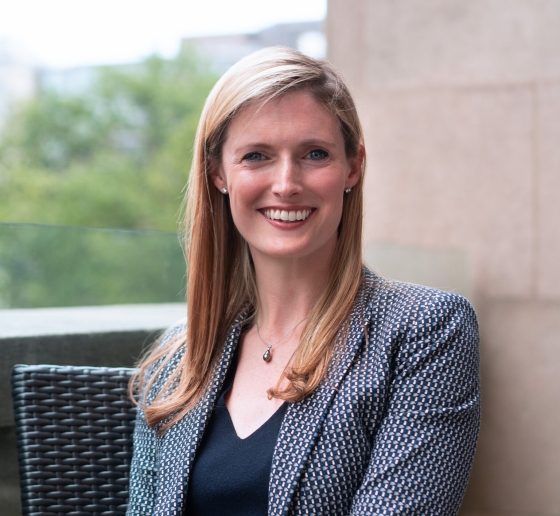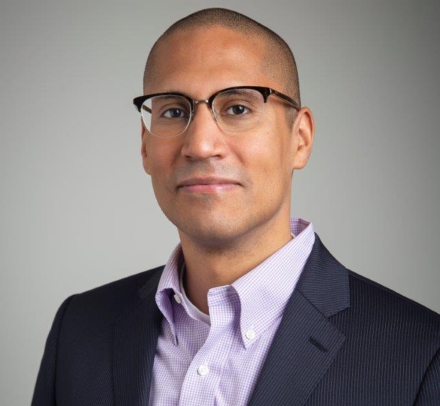How I Got Here: Alexandra Reeve Givens ’08
Alexandra Reeve Givens ’08 is president and CEO of the Center for Democracy & Technology, a nonprofit organization that shapes technology policy with a focus on human rights.

How do you describe the Center for Democracy & Technology (CDT)?
CDT is a nonpartisan advocacy organization, and we work to protect people’s rights and our democracy in the digital age. In practice, that means that we fight for things like people’s online privacy, ensuring the responsible development and use of AI, and improving the practices of social media platforms.
What exactly do you do?
As CEO, I set our direction and strategy and represent the organization through public speaking and advocacy. I foster our partnerships to make sure that we’re working with the communities most impacted by technology. And I do a lot of management work—fundraising, recruiting, creating a workplace where our staff can thrive.
What do you love about your job?
I love the variety—most of the time! On any given day, I can move from meeting with senior government leaders to editing a brief to reviewing our leave policy to choosing the napkins for a fundraising event.
The other piece that I enjoy is helping people understand how decisions about technology design and policy affect their daily lives. Often, we take tech for granted and don’t really think about it. But if you care about voting rights in 2024, if you care about civil rights in 2024, if you care about the health of our democracy in 2024—all of those are tech policy issues. There’s an enormous amount of work to be done educating people about what’s at stake, and helping impacted communities and subject-matter experts get a seat at the table. We spend a lot of time talking to groups that work on legacy civil rights issues, voting rights, and women’s rights issues and explaining why they should be participating in conversations around AI’s use and design, around privacy, and around online content. We think about it as a big-tent theory of change. We need all of those groups working together to shape our digital future. And that's really interesting because it is a new and nascent space.
You mentioned voting rights and democracy. As we approach the November election, has anything changed about your work?
We’re working directly with tech companies on how the design and use of their products impact the public’s information about elections. That includes working with generative AI companies on whether they are putting out trustworthy information about when and how people can vote. We advocate directly to social media companies about their responsibility to address mis- and disinformation, to think about the essential role they play in mediating our democracy. We also work directly with election officials to help them understand potential threats and how they can communicate with voters ahead of time to earn public trust. And we work with community leaders to help voters know where to go for trusted information about where to vote and how to vote. It’s a full ecosystem approach.
How did Columbia Law School prepare you for your career?
The foundational classes were hugely important to me. Constitutional law, federal courts, and administrative law are subjects that you don’t want to have to teach yourself! They are the building blocks for the legal system that gave me confidence to move in various spaces, and I then layered specific subjects on top of that foundational work. I also challenged myself to take skills classes, which I always recommend for students. Negotiations and trial practice were really important to help me find my voice and particular tone of advocacy.
I studied international human rights law while I was at Columbia—Professor George Bermann was my Note editor, and I wrote about the Alien Tort Statute. I always had a deep commitment to social justice issues, but at the same time, I wanted practical experience, so after graduation, I went to Cravath, Swaine & Moore. I wanted to understand how the corporate world works. But I felt that working in policy was my calling. I asked myself, “What is the most interesting job a lawyer can have in Washington, D.C.?” One answer was working on the Senate Judiciary Committee.
You spent more than five years working in the Senate. Was it difficult to move from Big Law to public policy work?
The reason I was able to move from a generalist career in private practice was because I was hired as a judicial nominations counsel. A nominations counsel analyzes the professional backgrounds and writings of any candidate nominated to the bench; it was the one space in Congress where being a general purpose litigator was incredibly useful. I could work long hours, read very dense documents, and jump between disparate areas of the law. And as I was doing that work, I tried to get assignments from other policy teams to gain exposure—particularly in the space of consumer protection and then, ultimately, technology policy.
Your expertise in technology policy then helped you make another career leap, this time to academia.
I’d been on the Senate Judiciary Committee for more than five years and had become chief counsel covering technology with a focus on consumer protection, innovation, and protecting people’s rights. And that was enough for the faculty at Georgetown to reach out to me when they were creating a new Institute for Technology Law & Policy. My role as founding executive director involved everything from developing training programs for congressional staff to writing reports and briefs on different policy issues with the support of student research assistants to launching two new degree programs. It was a really fun combination of policy work while thinking about how to create entryways and pathways into this career field, and building up nonprofit management expertise.
Since you joined the CDT in 2020, there have been so many developments in AI, social media, and online privacy—both tremendous opportunities and troubling challenges. How do you stay resilient?
A highlight of my work is that I don’t just have to read about technology or democracy issues in the newspaper; I can actually make an effort to push for change. That’s rewarding and motivating. One of the best ways to deal with uncertainty is to find a way you can contribute to the fight. I’m lucky to have a job where I get to contribute to an emerging field every day and help other people do the same. I wake up every day driven to make sure that we don’t waste this moment: that we actually learn the lessons of the past, and make sure technology develops well and responsibly, so we can all benefit from it.
This interview has been edited and condensed.
